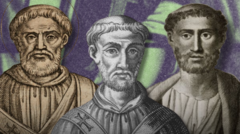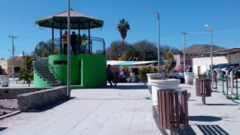With the impending selection of a new pope, historical contributions from North Africa's three early popes—Victor I, Miltiades, and Gelasius I—reveal how their legacies shaped Christian practices and continue to resonate today. Over 1,500 years after the last North African pope, many hope the next pontiff may emerge from regions where Catholicism is thriving.
North Africa's Historical Influence on Christianity and Its Potential Resurgence

North Africa's Historical Influence on Christianity and Its Potential Resurgence
Once a hub of early Christian leadership, North Africa's influence on the Church persists as aspirations grow for a return of an African pope.
Historically known as a bastion of Christianity, North Africa once flourished with early leaders of the Church who significantly influenced its development. Despite now being predominantly Muslim, the region produced three noteworthy popes during the Roman Empire: Victor I, Miltiades, and Gelasius I, whose legacies still echo within the modern Church.
Prof. Christopher Bellitto, a historian at Kean University, depicts North Africa as "the Bible Belt of ancient Christianity." As the Catholic Church gears up for a new papal election, many African Catholics express hope for a successor to Pope Francis to come from their continent for the first time in over 1,500 years.
Pope Victor I, believed to be of Berber descent, notably championed the celebration of Easter on a specific Sunday, distinguishing Western practices from those of Eastern Christianity. He convened the first Roman Synod to address the "Easter controversy," a momentous decision facilitated by his authority at a time when Christians faced persecution.
Following Victor I, Pope Miltiades witnessed a new era for Christianity as the Roman Empire began to embrace the faith. His tenure marked the establishment of the Lateran Basilica, recognized today as "the mother of all churches." While he benefited from the Empire's newfound acceptance of Christianity, his influence as a negotiator was less pronounced compared to his predecessors.
The final African pope, Gelasius I, is acclaimed for his pivotal role in defining the papacy's power, coining the term "Vicar of Christ" and pioneering the Doctrine of the Two Swords, which articulated the Church's supremacy over the state. He also established the celebration of St. Valentine's Day in 496, a strategic move to incorporate existing pagan festivities into Christian practice.
Despite the rich history of these formidable leaders, North Africa hasn't produced a pope since Gelasius I, with many historians attributing the decline of the Church in the region to the Islamic conquests beginning in the 7th century. Although some argue that the cultural shift contributed to the absence of African representation in the papacy, others contend that Italian dominance in papal elections has played a significant role.
Catholicism is experiencing robust growth across sub-Saharan Africa, with approximately 281 million Catholics reported in 2023. As the election of a new pope nears, Africans like Fridolin Ambongo Besungu, Peter Kodwo Appiah Turkson, and Robert Sarah stand as prominent candidates, igniting hope for future African representation in the papacy. Prof. Mwaura of Kenyatta University points out that while Christianity is vibrant in Africa, resources remain concentrated in the north, posing challenges for a more diversified leadership.
As the Catholic Church navigates its future, the possibility of an African pope remains an intriguing discussion, one that resonates strongly throughout the continent’s ever-evolving spiritual landscape.




















